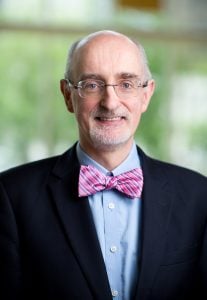Gluten-Free Video by Telemark Films Sets Record Straight on Celiac Disease
Celiac disease experts Drs. Alessio Fasano, Stefano Guandalini and Joseph Murray weigh in on modern myths and share theories on what is really driving the increased incidence of gluten-related disorders.
If you don’t have time to sink into this excellent 49 minute video, scroll down for the transcribed highlights.
- Learn everything you need to know about celiac disease and the gluten-free diet at celiac.ca
What is the difference between celiac disease and non-celiac gluten sensititivity
- Dr. Alessio Fasano, Gastroenterologist at the Centre for Celiac Research at Massachusetts General Hospital

Dr Allesio Fasano
- North America’s fast food society has created a perfect storm for gluten
- Gluten is the only protein humans eat that we cannot entirely digest
- Studies find that people can tolerate gluten for 40-50-60 years of age and all of a sudden, can have an immune response to gluten. How did these individuals avoid the reaction for so long and what triggered them to react?
- Celiac Disease (CD) is the most frequent genetic disorder of human kind, affecting 3 million people in the US; 3 hundred thousand in Canada. Its little sister, Non-Celiac Gluten Sensitivity (NCGS) is estimated to affect more than 25 times that number – 80 million people in the United States.
- Humans have an ‘innate immunity’ to fight indigestible gluten immediately. A second branch of immunity called ‘adaptive immune system’ is also involved but takes more time to create customized antibodies to gluten.
- The problem with celiacs is that the two immune systems do not properly co-ordinate. The ‘adaptive immunity,’ instead of targeting gluten, targets its own body instead. Brain = MS. Pancreas = diabetes. Intestine = celiac disease.
- In NCGS, miscommunication between the ‘innate immunity’ and ‘adaptive immunity’ does NOT occur. Their response to gluten is strictly ‘innate’ and does not impact the body with the autoimmune response that occurs in those with celiac disease.
- CD can lead to death. NCGS does not.
Areas of future research – explore the relationship between gluten and neurological, cognitive and behavioral disorders ie. autism, attention deficit disorder, depression and schizophrenia.
Why are millions of people suddenly being diagnosed with gluten-related illness?
- Dr. Stefano Guandalini, Founder and Medical Director of the University of Chicago Celiac Disease, founder North American Society for the Study of Celiac Disease.
Misconceptions

Dr. Stefano Guandalini
- Modern wheat contains more gluten than wheat available 100 years ago. FALSE: Comparing cultivars – the average amount of gluten in wheat is the same – between 10 to 15%
- Genetic modifications. FALSE: There is no genetically modified wheats commercially available in any country in the world.
- Americans are eating more gluten today that they did 100 years ago? FALSE: People are eating approximately half the amount of wheat consumed per day than in 1910.
- Gluten is more present in our food through increased use of additive ‘vital gluten’ – pure concentrated gluten in foods. FALSE: While the use of vital gluten has tripled, people are consuming still only half of the amount of gluten in total than consumed 100 years ago.
None of the above are affecting the increased prevalence of CD in genetically predisposed individuals.
Hygiene Hypothesis
Dr. Guandalini suggests that what is missing from our diet from birth to 18 months is bacteria. Our gut is not being exposed to ‘dirty’ bacteria and as a result of our cleanliness our gut’s immune response not receiving the antigenic load, cues its response to developing autoimmune and allergic diseases. Many other autoimmune diseases are increasing in prevalence. ie diabetes. Developing nations have almost no incidence of auto-immune diseases until the country develops.
Most people are not aware that they have CD or NCGS
- Dr. Joseph Murray, Gastroenterologist at Mayo Clinic, President of the North American Society for the Study of Celiac Disease

Dr. Stefano Guandalini
Challenge to finding CD is suspecting it. Many patients with CD are not discovered for many years after their problems start. Varying symptoms make CD a chamelion disease.
- Study of gluten antibodies from 60 year-old blood compared to blood samples taken today but found four time the incidence.
- Patients who scored negative for CD were found to develop it 20 years later. Something has changed in the last 3-4 decades, likely driven by environment.
- It was also observed that the hazard ratio (death rate) for subjects living with undiagnosed CD was 4 times greater than those without CD.
- We are not finding more celiac disease because we are better at finding it, it is because there are in fact more celiacs.
- 1% of caucasions have celiac disease – only 1/4 to 1/5 are diagnosed. Complications – lymphomas, cancers of the intestines, other cancers. Best to pre-screen those at risk of developing CD ie relatives.
Conclusions
New disease occurences will continue until we can figure out what is driving the increase and then stop it. The most important long-term goal is prevention.
- Dr. Joseph Murray
It is worrying that 85% of celiacs remain undiagnosed – we all should do a better job of screening for CD. CD is a unique autoimmune condition among autoimmune conditions. We know the environmental trigger (gluten), we know the auto-antigen (tissue transglutaminase) and we understand the process. Unlocking the mystery for CD may allow us to cure other autoimmune conditions.
- Dr. Stefano Guandalini
Of all of the autoimmune diseases to have, you want CD. You can be treated. The gluten-free diet eliminates the disease.
If you think you have a gluten-related disorder, do NOT start the gluten-free diet without a diagnosis. That is a major mistake because the tools to understanding which part of the spectrum you are on are gone. Seek medical advice right away.
- Dr. Alessio Fasano













